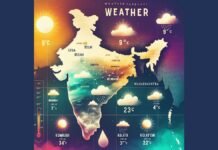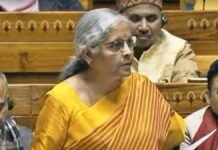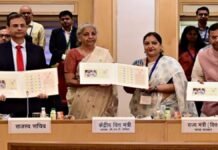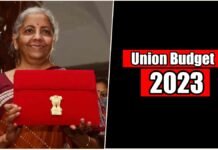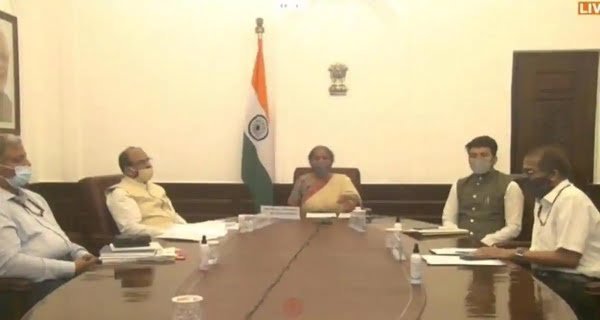
New Delhi: Amidst the demand for non-NDA governed states to get GST compensation immediately, the Center on Thursday gave the states two options to make up for the reduction in GST revenue. Under this, states can borrow from the market in lieu of future tax receipts. However, Punjab and Delhi have expressed their disagreement on this. The Center has projected a decrease of Rs 2.35 lakh crore in GST revenue receipts in the current financial year.
Finance Minister Nirmala Sitharaman said after a five-hour meeting of the GST Council that there has been a decrease in revenue due to the Covid-19 epidemic and there is no proposal to increase the tax rates to make up for it. He rejected the possibility of replenishing the revenue by taking loans from the central government’s own fund or in his account, citing the legal opinion of the Attorney General. The Center also clarified the difference between the revenue loss due to the implementation of GST and the economic slowdown due to the Covid-19 crisis.

The government said that its legal obligation is only to compensate for the loss in revenue due to GST. The Finance Minister said that the states can make up the deficit by taking loans using a special window. This debt can be repaid after five years from GST cess collection. He said that due to the implementation of GST, states can take a loan of Rs 97,000 crore in revenue or the entire amount of Rs 2.35 lakh crore from the market. If the states agree on any of these options, it would mean that the cess would continue even after five years of GST implementation.
Meanwhile, Punjab Finance Minister Manpreet Singh Badal said that the solution suggested by the Center is not acceptable to the state. Badal said, “Under the solution, it is emphasized that the Center will guarantee and the amount will be paid from the compensation cess which will continue for 2-3 years.” This is not acceptable to Punjab. ” He said that the state needs an amount of Rs 6,500 crore as compensation item.
At the same time, Delhi Deputy Chief Minister Manish Sisodia said that under the existing administrative structure, the Delhi government cannot take loans from RBI. The Center should take steps on its own to meet the deficit of Rs 21,000 crore. He said, “The Center promised that if there is a reduction in the revenue of the states at the rate of 14 percent increase, it will compensate it for five years. But the Center denied this today. They say that there is no provision for compensation in case of an epidemic. “
Non-NDA-ruled states such as Kerala, Punjab, and West Bengal strongly opined on the obligation to compensate the Center. However, Sitharaman said that there was no attempt to give political color to the GST Council meeting held on Thursday. He said, “There was a concern that all of us get compensation in lieu of revenue loss… not politicized.” There was the concern and an attempt was made to remove the anxiety by presenting alternatives. “
The Finance Minister said that but there has definitely been an attempt to give it a political color. In the year 2017, all the states had agreed to implement Goods and Services Tax (GST) by incorporating their local taxes including VAT. In return, the Center promised to compensate for any shortfall in revenue for five years. Revenue Secretary Ajay Bhushan Pandey said that the shortfall of Rs 97,000 crore was due to GST implementation while the rest was due to Kovid-19’s impact on the economy.
Pandey, who also holds the responsibility of Finance Secretary, said that in 2019-20 the revenue shortfall was Rs 70,000 crore, which was compensated by the surplus of the last two years. But this year the epidemic has had an impact on GST collections. When GST was implemented in 2017, the Center promised to compensate for any shortfall in revenue. Arrangements were made to compensate for the revenue received by levying cess on casual (luxury) and non-profit items. The collection in this fund remained in surplus for the first two years. But in 2019-20 and the current financial year, the collection was less than the amount given in it.
Describing the options given to the states, Sitharaman said that after consulting the Reserve Bank, special options can be made available to the states. Under this, Rs 97,000 crore can be provided at a reasonable interest rate. This amount can be paid from the cess collection after five years. Another option is that states take the entire GST compensation amount of Rs. 2,35,000 crore through special arrangements. He said that the states have been given seven days’ time to consider these proposals.
The Finance Minister said, “The interest on the loan will be paid from the cess collection five years after the GST is implemented.” He said, “There will be no additional burden on the states.” States have been asked to take loans through RBI to ensure that all states can get loans easily and bond returns do not increase. Sitharaman said that the GST Council has decided that the loan system is for the current financial year and will be reviewed at the beginning of the next financial year. Detailed information about both these options will be shared with the states and they will give their opinion on this in seven working days.




